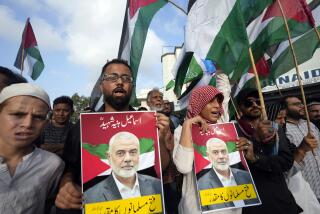U.S. Ponders Sanctions on Palestinians
- Share via
WASHINGTON — Exasperated with Yasser Arafat, the United States is considering a raft of punitive measures against the Palestinian Authority because of its leader’s failure to end terrorism and deal with arms smugglers, U.S. officials said Thursday.
The moves now under debate include drastic steps such as closing down the group’s Washington “embassy,” or pre-statehood diplomatic office, and suspending relations, sources said.
The deliberations mark a turning point in U.S. relations with the Palestinian movement, which are today more strained than at any time since the peace process began in the early 1990s, according to U.S. officials, Arab diplomats and Mideast experts.
But the tension is particularly ominous for Arafat because the Bush administration holds him personally responsible for a series of setbacks in U.S.-brokered peace efforts.
“We’ve called on him to make a strategic decision [about his commitment to the peace process]. But the problem from the [2000] Camp David talks onward is that he wants to be everything to everybody in his organization and the Arab world, so he won’t do it,” a senior State Department official said.
“Every time we think he’s about to do or say something, we instead see an organized attack by groups he hasn’t clamped down on or Palestinian involvement in arms smuggling. And this isn’t acceptable,” the official said.
The policy options under debate include cutting off talks with Arafat but continuing informal discussions with others in the Palestinian Authority. Another option is formally suspending the peace mission of special envoy Anthony C. Zinni, who has made two short-lived attempts at ending the cycle of violence.
“This is the worst time in relations between Arafat and the United States since 1993--or even before 1993. The administration is now questioning whether the entire enterprise of dealing with Arafat is even possible,” said Shibley Telhami, a Brookings Institution fellow and holder of the Anwar Sadat chair in peace and development at the University of Maryland.
The Palestinian leader’s recent handling of an incident involving the Karine-A, a ship smuggling Iranian arms to the Gaza Strip that was intercepted by Israel, was seen as the last straw for many in Washington, both because Arafat allegedly lied about his government’s role in the operation and because he claimed to clamp down in ways he did not.
Arafat said he ordered the arrest of three Palestinians in the smuggling operation, then later admitted that only one was detained because the other two could not be found. In the end, U.S. officials claim, none of the three was arrested.
Presented with damning evidence from Israeli intelligence, the United States is also demanding that Arafat admit he knew about the deal and that he arrest several figures identified as connected to the shipment.
The Karine-A incident marked a dangerous escalation in tension, U.S. officials say. Arafat had declared a cease-fire just before the shipment was discovered. And the weapons, including explosives, mortars and other, more sophisticated arms, suggested a new and direct Iranian connection with the Palestinians.
“We want a full explanation of what this is all about. Then we want to see the people involved arrested and pulled in--not just ‘Let’s pretend,’ ” the U.S. official said.
Washington is also demanding that Arafat, whom Israeli forces have had under virtual house arrest for weeks at his headquarters in the West Bank city of Ramallah, shut down all extremist groups and arrest everyone involved in them.
In a reflection of how low relations have sunk, there is only a narrow gap among U.S. policymakers as they deliberate the next step. The two sides are divided into hard-line and harder-line camps, according to Robert Satloff, director of the Washington Institute of Near East Policy.
“The hard-liners say we have to create a situation where Arafat has no choice but to do the right thing, so we must set high standards and deadlines. We’ll send him down a tunnel in which there is only one way out,” he said. “The harder-line approach is to consider steps toward suspension of relations with Arafat altogether, on the basis that Arafat is now beyond the pale. The Karine-A underscores that for the U.S. to be party to relations with the current Palestinian leadership would bring about a state inimical to U.S. interests.”
In the meantime, the United States has let up its pressure on Israel to end its targeted killings of militants and its punitive measures against the Palestinians.
White House Press Secretary Ari Fleischer said Thursday that President Bush “understands the reason that Israel has taken the action that it takes.”
More to Read
Sign up for Essential California
The most important California stories and recommendations in your inbox every morning.
You may occasionally receive promotional content from the Los Angeles Times.













